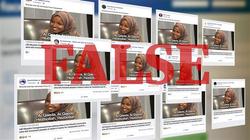 A “mysterious” Israel-based group has been co-opting separate far-right pages on Facebook to spread anti-Islam hate messages both for financial profit and influence in politics across the world, an investigation has found.
A “mysterious” Israel-based group has been co-opting separate far-right pages on Facebook to spread anti-Islam hate messages both for financial profit and influence in politics across the world, an investigation has found. RNA - An exclusive investigation published by British newspaper The Guardian on Thursday revealed that unidentified operators at the Israel-based group gained access to existing right-wing pages by messaging their administrators and offering to help increase their content and reach by acting as “editors.”
At least 21 “organically grown” far-right pages — some of which are among the largest of such pages on Facebook — have been co-opted by the Israeli entity during the past two years, the report said.
“Once they (the Israelis) gain access, the Israeli administrators publish identical posts almost simultaneously to the network’s 21 Facebook pages, which have a combined 1 million followers,” The Guardian wrote.
The posts spread hatred against Islam “across the western world,” the report said, specifically stating that the group influences “politics in Australia, Canada, the UK and the US by amplifying far-right parties.”
The posts also attempt to vilify Muslim politicians, such as US Democratic Representative Ilhan Omar, and target left-wing figures such as UK Labour Party leader Jeremy Corbyn “at critical points in national election campaigns” with false stories.
Omar has spoken out against Israeli policies in Palestine in the past, as well.
The group also seeks to make money out of the online traffic by directing its audiences to “10 advertisement heavy websites.”
Using the assistance of Queensland University of Technology, The Guardian’s investigation was able to confirm that the Facebook posts in question were “distributed by a single source” and probably with the help of “auto-scheduling software.”
“Those behind the network have gone to great lengths to hide their identity,” the report said.
According to Press TV, the investigation revealed that the group has so far published at least 165,000 posts and attracted 14.3 million likes, shares, or comments, with nearly 6,000 posts being published in October alone, attracting about 850,000 likes, shares, or comments.
After The Guardian notified Facebook of the investigation’s findings, the social media company responded by saying that it had removed pages “that appeared to be financially motivated.”
“Nobody can advocate or advertise hate or violence on Facebook and we remove any violations as soon as we become aware,” a spokesperson for the group told The Guardian.
The newspaper, however, described its revelations as an instance demonstrating Facebook’s failure to stop coordinated hate campaigns.
“The network uncovered by the Guardian has operated with relative impunity even since [Facebook CEO] Mark Zuckerberg offered his apology to the US Senate” last year following a series of privacy and alleged foreign interference scandals in the US, the report said.
847/940